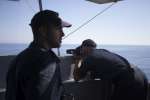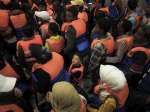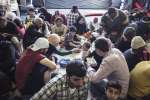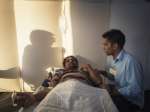Canadian officials, NGOs tackle lack of legal help for some asylum seekers
News Stories, 5 June 2009
VANCOUVER, Canada, June 5 (UNHCR) – The Canadian government and non-governmental organizations, in collaboration with UNHCR, have met to try and ensure that asylum applicants get assistance to better present their claims.
"This is a novel approach to tackling the issue," said Ross Pattee, assistant deputy chairperson in western Canada for the Immigration and Refuge Board (IRB). A recent meeting in Vancouver brought together 36 delegates from various agencies, each with a different mandate but all working to protect refugees.
"In a perfect world, every asylum seeker would have representation, but this is not the case. We are going to all try to make this work for unrepresented claimants," said Pattee. "Each case is critical to us and every time we hear a case, we want it to be well prepared to make sure procedures go smoothly. We want to be efficient and ensure fair procedures."
The meeting was called by the Refugee Protection Division of the IRB Western Region, in collaboration with UNHCR, specifically to focus on how to properly fill out the IRB's Personal Information Form, commonly called "the PIF," which forms the basis of a refugee claim before the tribunal. Attending were representatives from Citizenship and Immigration Canada and Canada Border Services Agency.
The IRB examines the PIF to identify legal and evidence issues, and the time needed for the hearing. PIFs prepared by unrepresented claimants are often less clear, making it more difficult for officials to prepare the case in advance and raising the prospect of lengthier hearings.
Many asylum seekers cannot afford a lawyer and with demand for legal aid outpacing available service in Vancouver, many go unrepresented. NGOs, faith-based groups and service providers, despite also facing limited resources, are being encouraged to help asylum seekers to complete the PIF or at least provide them guidance.
Rod Holloway, who represented the Legal Services Society, said the annual legal aid budget of US$1.7 million has remained unchanged the last three years despite a significant increase in the number of asylum seekers coming to the province. As a result it is likely that up to 50 percent of claimants will be unrepresented.
"We have made inquiries but there is no funding available," said Holloway. "As funding has not increased to compensate for the demand, we have started screening out claims. Only cases which we deem have reasonable chances of success will be funded by Legal Services Society. The rest will probably be coming your way," he said to those present.
Non-governmental organizations (NGO), faith-based groups and service providers appreciated the usefulness of the meeting and expressed a desire for more such multi-agency activities in the near future.
"A session of this nature enhances the ability of NGOs to assist asylum seekers to tell their stories of persecution. UNHCR is honored to serve as a facilitator between the many partners involved in refugee protection," said Lesley Stalker, UNHCR assistant legal officer in Vancouver.
















































